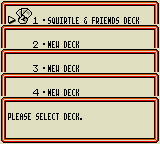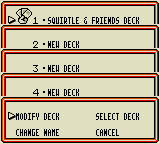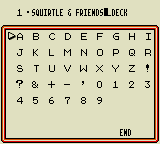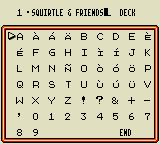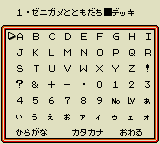Deck (TCG GB)
The deck (Japanese: デッキ deck; 山札 deck) contains the cards used by a duelist in the video games Pokémon Trading Card Game and Pokémon Trading Card Game 2: The Invasion of Team GR!. In these games, duelists use 60-card decks. The player may have up to 4 decks and save additional customized decks in the Deck Save Machine. Additional predefined deck configurations may be built with the Auto Deck Machine if the player has all the required cards. The decks are edited using the Deck option in the menu.
Terminology
In the Japanese video games, the word デッキ refers to a deck configuration (as in the phrases "build a deck", "dismantle a deck"), while the word 山札 refers to the deck pile from which the cards are drawn (as in the phrases "shuffle the deck", "draw a card from the deck"). They are equally translated as "deck" in English.
List of decks
In both games, the Deck option in the menu displays the list of decks, which contains four deck slots. If the player has more than one built deck, they may choose one of them as their main deck, which is identified by a symbol of a hand holding cards. The main deck is used in all duels. Empty decks have the placeholder text "New Deck" (Japanese: あたらしく つくる build new). The only information available on this screen are the names of the decks, the deck slots used, and which is the main deck.
The player always has at least one deck, since they receive a starter deck at the beginning of each game.
Options
| English | Japanese | Notes |
|---|---|---|
| Modify deck | デッキかいぞう Modify deck | List the cards in an existing deck, or create a new deck in an available slot. |
| Select deck | つかうデッキ Use deck | Pick the main deck. |
| Change name | なまえをかえる Change name | Rename the deck. |
| Cancel | やめる Stop |
List of cards
In both games, each deck may be edited with a list of all available cards. The cards are distributed in nine pages: the first seven are Pokémon types (Grass, Fire, Water, Lightning, Fighting, Psychic, and Colorless), and the other two are Trainer cards, and Energy cards. The cards are ordered by their index number which is hidden in the internal data, except the energy cards are at the last page rather than the first. The Pokémon cards in each type page are organized by their National Pokédex number. All cards of the same name are listed together. Variations such as Flying Pikachu, Dark Slowbro, and Cool Porygon are listed directly after their normal versions. All evolutionary lines are listed together, except for Eevee's family which is split between different type pages. Pokémon cards with the same name are organized by their level. The current and maximum number of each card is shown. (for instance, "3/8" means that 3 cards are in the current deck, out of 8 available cards) However, cards used in other decks don't count as available cards, so it's possible the maximum number of a card will be "0" until it is removed from another deck or the player receives a repeated card. If the player doesn't have a certain card, it doesn't appear in the list at all.
There may be up to 4 cards of the same name per deck, except there is no limit for the number of repeated Basic Energy cards in the deck. Different Pokémon cards with the same name count toward the 4-card limit, but variations with different names count as different cards. For instance, the player may have not only four Pikachu cards, but also four Flying Pikachu cards in the same deck. The finished deck is required to have exactly 60 cards and at least 1 of which must be a Basic Pokémon card, or else it can't be saved. It is possible to save a deck with no Energy cards, but the Pokémon won't be able to attack if this deck is used in a duel. While the deck is being edited, it can have between 0 and 80 cards.
In Pokémon Trading Card Game 2: The Invasion of Team GR!, whenever the player creates a new deck, edits or dismantles an existing deck, the game asks if they want a copy of the configuration saved in the Deck Save Machine.
Options
The player may press B in the list of cards to see these options. In Pokémon Trading Card Game 2: The Invasion of Team GR!, this menu is displayed together with a list of how many Energy cards, Basic Pokémon cards, Stage 1 Pokémon cards, Stage 2 Pokémon cards, and Trainer cards are in the deck, including any unsaved changes.
| English | Japanese | Notes |
|---|---|---|
| Confirm | かくにん Confirm | A list of cards currently in the deck |
| Modify | かいぞう Modify | Close the menu and go back to the list of cards, which is also doable by pressing B again. |
| Name | なまえ Name | Rename the deck. |
| Save | ほぞん Save | Save changes to the deck. |
| Dismantle | くずす Dismantle | Dismantle the deck, allowing the cards to be used in other decks and freeing the current deck slot. |
| Cancel | やめる Stop | Quit without saving. A confirmation prompt will appear if there were any changes. |
Confirmation screen
The Confirm option displays a list of cards currently in the deck, including any unsaved changes. It also displays the name of the deck, the deck slot used, and the number of cards in the deck. If this is currently the main deck, then the symbol of a hand holding cards is displayed here as well. This screen is also accessible by pressing Start either in the list of decks or in the list of cards in a deck.
Deck name
The deck name may have up to 20 characters in the American and European versions of the first game or 10 characters in the Japanese version of both games. The word "Deck" is mandatory at the end (or at the beginning in some languages), which is automatically added and doesn't count towards the character limit. In the Japanese version of Pokémon Trading Card Game, there are 3 separate screens: hiragana, katakana, and capital letters. In Pokémon Trading Card Game 2: The Invasion of Team GR! (which is Japan-only), there are 4 separate screens: the same as before plus another for lowercase letters. The Select button is a shortcut to switch screens, which does not do anything in languages other than Japanese. The player types the deck name by pointing the cursor to a character and pressing A, and erases the last character by pressing B. There is an End (Japanese: おわる Finish) button at the end of the deck name screen, to finish typing the deck name. The Start button is a shortcut to point the cursor to the End button.
Available characters
These are the available characters for the deck name, depending on the game and language.
Default names
If the player attempts to save an unnamed deck, then a default name is automatically used, which includes a three-digit number indicating how many times the default name was applied to any deck. The first deck includes "001", the second deck includes "002" and so on. After "999", the next deck returns to "001".
| GB1 (American) | GB1 (European) | GB1 / GB2 (Japanese) | |
|---|---|---|---|
| Default name format | Deck <number> Deck | <number> Deck | <player name>の<number>デッキ (<player name>'s <number> Deck) |
| Example | Deck 001 Deck | 001 Deck | パークの001デッキ (Park's 001 Deck) |
In the European version, if a language other than English is used, then the word "Deck" is translated as usual. For instance, the "001 Deck" in Spanish is "Mazo 001".
Inverted exclamation mark and question mark
In the Spanish version of the first game, some predefined decks are named with the inverted exclamation mark (¡) and question mark (¿), even though these punctuation marks are unavailable to the player: Paralyze! Deck and Imakuni? Deck are named "Mazo ¡Paralizar!" and "Mazo ¿Imakuni?" in Spanish, respectively. If the player wishes to start a deck name with the character "¡" in the Spanish version, they may circumvent this limitation by building the Spanish deck named "Mazo ¡Paralizar!" from the Auto Deck Machine (which requires the Water Medal and all the cards from this deck), then they may freely rename this deck and change the cards, while keeping the "¡" as the first character. This is not possible with the Imakuni? Deck, which is unavailable from the Auto Deck Machines.
Unusable cards
In Pokémon Trading Card Game 2: The Invasion of Team GR!, the Bill's PC card is unable to be placed in any deck. This card is not supposed to be used in normal play; instead, it is used to exchange other cards at the Game Center. This card doesn't appear in the Deck screen even if the player has it. However, this card still appears in the "View card catalogue" screen of the Minicom and the "Card album" screen of the PC.
Glitches
In Pokémon Trading Card Game 2: The Invasion of Team GR!, there are some deck-related glitches:
- The dismantle deck glitch is an oversight where the player is unable to dismantle a deck unless they accept to display the Deck Save Machine screen first.
- The premature deck save glitch allows the player to save a deck even with invalid changes. As a result, they may have a non-standard deck between 1 and 80 cards, which is allowed to have no Basic Pokémon cards. However, duels still require 60-card decks, so the extra cards are ignored and the missing cards are replaced by invalid cards, which may corrupt the save.
- The hidden deck name glitch causes a hidden deck name to appear automatically when a new deck is created in an unused "New Deck" slot.
Gallery
Pokémon Trading Card Game
Pokémon Card GB2: Here Comes Team GR!
Almost all the deck editing screens found in the first game are also present in the second game, except for these differences:
- The second game is only available in Japanese.
- A summary of cards in the deck appears when the player is viewing the list of cards in the deck and enables the menu.
- Some of the characters available for the deck name are different. The ability to type deck names with small letters was introduced in the second game.
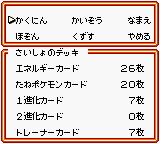
|
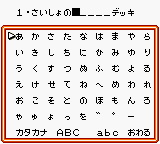
|
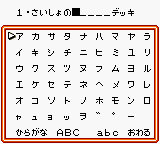
|
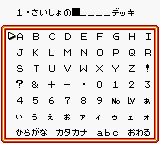
|
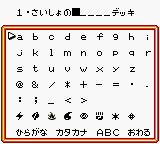
|
|---|---|---|---|---|
| Summary of cards in the deck | Deck name (hiragana) | Deck name (katakana) | Deck name (capital letters) | Deck name (small letters) |
In other languages
| |||||||||||||||||||||

|
This article is part of both Project Sidegames and Project TCG, Bulbapedia projects that, together, aim to write comprehensive articles on TCG-related video games. | 
|
